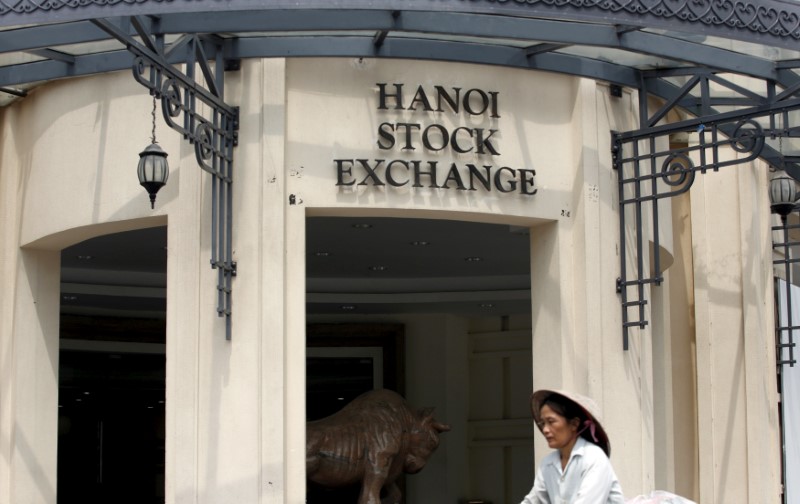By Anshuman Daga and Mai Nguyen
SINGAPORE/HANOI (Reuters) - Vietnam has just celebrated its two biggest IPOs and its first-ever ranking as Southeast Asia's hottest capital market. But its benchmark index has also just suffered its worst monthly fall in seven years, prompting fund managers and strategists to warn valuations may have peaked.
The small frontier market, whose main index has a market value of $128 billion, has in recent years become an investor darling, buoyed by a fast-growing economy and expectations that it could be reclassified as a mainstream emerging market when the index provider MSCI publishes its annual review in June.
Investor appetite has been whetted further by the government's ambitious privatization and market reform plans.
The Vietnam Index (VNI) is still up 7 percent this year, and 70 percent over the last two years, but some analysts say that risks are rising as blue chips become expensive.
Hasnain Malik, equity research head at the London-based Exotix Capital, said that interest in Vietnam was "built on low political risk, export and consumption growth and low inflation", but investors had priced in those positives already.
"The market is more sensitive to any whiff of disappointment, rather than further confirmation of the positive," Malik said.
In addition to a sell-off in emerging markets and concerns over new rules related to margin lending, worries that Vietnamese stocks are over-valued led to a 10 percent fall in the market last month, which compares with a rise of 1 percent in MSCI's Asia ex-Japan index (MIAPJ0000PUS).
Large Vietnamese companies - those valued at more than $1 billion - are on aggregate trading at 19 times estimated profits for the next 12 months, compared with 14.7 times for Indonesia and 15.1 for Philippines, Reuters data shows.
Some firms stand out: Vingroup trades at 37 times estimated earnings.
Alan Richardson, senior portfolio manager of ASEAN equities at Samsung (KS:005930) Asset Management said: "The market is over-valued because investors have not priced in potential risk of rising capital markets volatility" from external factors like the brewing trade war between China and the United States.
He also cited tighter liquidity stemming from rising U.S. bond yields and the appreciation of the dollar.
All that could make equity fund flows turn negative.
Still, the sale of shares in Vinhomes, a residential property developer that is part of the country's biggest conglomerate, Vingroup JSC (HM:VIC), raised $2.2 billion over in the past month and attracted the likes of GIC, Singapore's sovereign wealth fund, and Mirae Asset Global Investments.
This eclipsed an equity offering from Techcombank, which raised about $920 million from investors including Fidelity, GIC and Dragon Capital, a local fund, last month.
Cornerstone investors took up roughly three-quarters of both issues, underlining strong interest in businesses benefiting from the booming economy and expanding middle class.
TOP PERFORMER
Despite the recent slump, Vietnam's equity market still ranks as Asia's best performer over the last two years.
The country has experienced a manufacturing boom that spurred its export-dependent economy to grow by 7.4 percent in the first quarter of this year - its fastest pace in a decade - after growing by 6.8 percent last year.
The government also has ambitious privatization plans and is aiming for IPOs for 64 state companies in 2018, including the telecoms firm MobiFone, and 18 others in 2019 such as the coffee company Vinacafe. Vietnam also plan to sell down state holdings in a further 181 already-privatized companies this year.
Some fund managers see the party ending for large cap stocks.
Foreigners were net buyers of $71 million worth of Vietnamese shares in April but they turned net sellers this month and offloaded a combined $102 million in the first five sessions this month, exchange data shows.
"Looking ahead, we believe the multiple expansion phase in the blue chips is more or less over and from here the market is likely to perform in line with profit growth," said Mattias Martinsson, chief investment officer at Swedish fund manager Tundra Fonder.
"For the next 2-3 years we expect profit growth will average at least double digit."
Even as they tout Vietnam's potential, some investors say the market decline may have been overdue.

"A number of the big companies have very attractive growth propositions but maybe, valuations have got a little bit overextended," said Lai Yeu Huan, senior portfolio manager at Nikko Asset Management Asia. "It's a good thing that it's correcting and shaking out some of the excessive valuations."